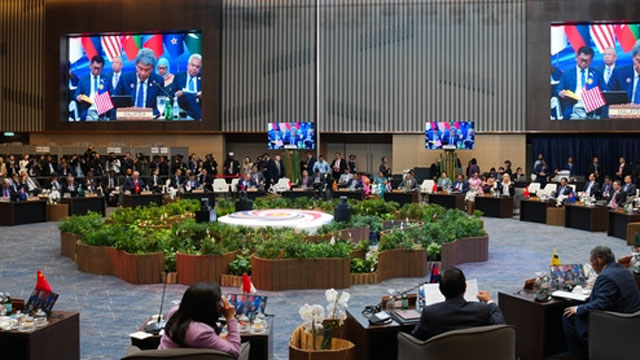WORLDWIDE POPULARITY OF K-CONTENT
입력 2022.09.14 (15:27)
수정 2022.09.14 (16:45)
읽어주기 기능은 크롬기반의
브라우저에서만 사용하실 수 있습니다.
[Anchor Lead]
Yesterday we talked about more good news for "Squid Game" at the Emmy Awards. With the latest trophies, Korean films and TV dramas have yet again proved their power on the global stage. Then what is behind the popularity of K-content that transcends language barriers? We take a look
[Pkg]
"Parasite" started the K-content craze.
[Soundbite] "Parasite!"
[Soundbite] "Bong Joon-ho!"
The 2019 film bagged four awards at the Oscars including Best Picture and Best Director. More surprising news followed in 2021.
[Soundbite] "The Oscar goes to Youn Yuh-jung!"
Youn Yuh-jung became the first Korean to win an Oscar for acting. The winning streak continued. "Squid Game" expanded its move from the film festival scene to the TV show awards. Being honored in the US market where both commercial and artistic success is critical is a testament to the immense competitiveness of K-contents.
[Soundbite] Hwang Dong-hyuk(Director, ‘Squid Game‘(KBS interview, Dec. 2021)) : "Korean viewers are sensitive to and stricter about the latest trends more than any others in the world. Satisfying them is a tough challenge which I believe helped create more competitive contents."
"Squid Game"'s global popularity lies in how it's a microcosm of a capitalist society. This resonates with people around the world, which is also true with "Parasite." Such universal characteristics played a part in overcoming the language barrier.
[Soundbite] Kim Hern-sik(Culture critic) : "There is an abundant desire for global citizens to seek alternative ways in real life by watching Asian and in particular Korean content. They are willing to endure the slight inconvenience of subtitles."
The Guardian ran an article saying that from music to movies, technology to food, the world has fallen in love with everything South Korean. Other foreign media are also taking notice of the rising power of K-culture and content.
Yesterday we talked about more good news for "Squid Game" at the Emmy Awards. With the latest trophies, Korean films and TV dramas have yet again proved their power on the global stage. Then what is behind the popularity of K-content that transcends language barriers? We take a look
[Pkg]
"Parasite" started the K-content craze.
[Soundbite] "Parasite!"
[Soundbite] "Bong Joon-ho!"
The 2019 film bagged four awards at the Oscars including Best Picture and Best Director. More surprising news followed in 2021.
[Soundbite] "The Oscar goes to Youn Yuh-jung!"
Youn Yuh-jung became the first Korean to win an Oscar for acting. The winning streak continued. "Squid Game" expanded its move from the film festival scene to the TV show awards. Being honored in the US market where both commercial and artistic success is critical is a testament to the immense competitiveness of K-contents.
[Soundbite] Hwang Dong-hyuk(Director, ‘Squid Game‘(KBS interview, Dec. 2021)) : "Korean viewers are sensitive to and stricter about the latest trends more than any others in the world. Satisfying them is a tough challenge which I believe helped create more competitive contents."
"Squid Game"'s global popularity lies in how it's a microcosm of a capitalist society. This resonates with people around the world, which is also true with "Parasite." Such universal characteristics played a part in overcoming the language barrier.
[Soundbite] Kim Hern-sik(Culture critic) : "There is an abundant desire for global citizens to seek alternative ways in real life by watching Asian and in particular Korean content. They are willing to endure the slight inconvenience of subtitles."
The Guardian ran an article saying that from music to movies, technology to food, the world has fallen in love with everything South Korean. Other foreign media are also taking notice of the rising power of K-culture and content.
■ 제보하기
▷ 카카오톡 : 'KBS제보' 검색, 채널 추가
▷ 전화 : 02-781-1234, 4444
▷ 이메일 : kbs1234@kbs.co.kr
▷ 유튜브, 네이버, 카카오에서도 KBS뉴스를 구독해주세요!
- WORLDWIDE POPULARITY OF K-CONTENT
-
- 입력 2022-09-14 15:27:55
- 수정2022-09-14 16:45:06

[Anchor Lead]
Yesterday we talked about more good news for "Squid Game" at the Emmy Awards. With the latest trophies, Korean films and TV dramas have yet again proved their power on the global stage. Then what is behind the popularity of K-content that transcends language barriers? We take a look
[Pkg]
"Parasite" started the K-content craze.
[Soundbite] "Parasite!"
[Soundbite] "Bong Joon-ho!"
The 2019 film bagged four awards at the Oscars including Best Picture and Best Director. More surprising news followed in 2021.
[Soundbite] "The Oscar goes to Youn Yuh-jung!"
Youn Yuh-jung became the first Korean to win an Oscar for acting. The winning streak continued. "Squid Game" expanded its move from the film festival scene to the TV show awards. Being honored in the US market where both commercial and artistic success is critical is a testament to the immense competitiveness of K-contents.
[Soundbite] Hwang Dong-hyuk(Director, ‘Squid Game‘(KBS interview, Dec. 2021)) : "Korean viewers are sensitive to and stricter about the latest trends more than any others in the world. Satisfying them is a tough challenge which I believe helped create more competitive contents."
"Squid Game"'s global popularity lies in how it's a microcosm of a capitalist society. This resonates with people around the world, which is also true with "Parasite." Such universal characteristics played a part in overcoming the language barrier.
[Soundbite] Kim Hern-sik(Culture critic) : "There is an abundant desire for global citizens to seek alternative ways in real life by watching Asian and in particular Korean content. They are willing to endure the slight inconvenience of subtitles."
The Guardian ran an article saying that from music to movies, technology to food, the world has fallen in love with everything South Korean. Other foreign media are also taking notice of the rising power of K-culture and content.
Yesterday we talked about more good news for "Squid Game" at the Emmy Awards. With the latest trophies, Korean films and TV dramas have yet again proved their power on the global stage. Then what is behind the popularity of K-content that transcends language barriers? We take a look
[Pkg]
"Parasite" started the K-content craze.
[Soundbite] "Parasite!"
[Soundbite] "Bong Joon-ho!"
The 2019 film bagged four awards at the Oscars including Best Picture and Best Director. More surprising news followed in 2021.
[Soundbite] "The Oscar goes to Youn Yuh-jung!"
Youn Yuh-jung became the first Korean to win an Oscar for acting. The winning streak continued. "Squid Game" expanded its move from the film festival scene to the TV show awards. Being honored in the US market where both commercial and artistic success is critical is a testament to the immense competitiveness of K-contents.
[Soundbite] Hwang Dong-hyuk(Director, ‘Squid Game‘(KBS interview, Dec. 2021)) : "Korean viewers are sensitive to and stricter about the latest trends more than any others in the world. Satisfying them is a tough challenge which I believe helped create more competitive contents."
"Squid Game"'s global popularity lies in how it's a microcosm of a capitalist society. This resonates with people around the world, which is also true with "Parasite." Such universal characteristics played a part in overcoming the language barrier.
[Soundbite] Kim Hern-sik(Culture critic) : "There is an abundant desire for global citizens to seek alternative ways in real life by watching Asian and in particular Korean content. They are willing to endure the slight inconvenience of subtitles."
The Guardian ran an article saying that from music to movies, technology to food, the world has fallen in love with everything South Korean. Other foreign media are also taking notice of the rising power of K-culture and content.
이 기사가 좋으셨다면
-
좋아요
0
-
응원해요
0
-
후속 원해요
0

















이 기사에 대한 의견을 남겨주세요.